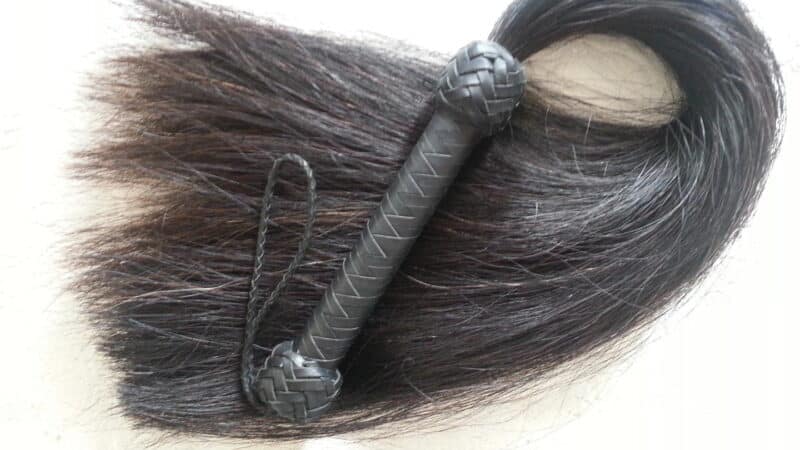If you’re interested in floggers but aren’t sure what your first one should be, understanding their materials is a good place to start.
The best baby step is getting something soft and then working your way up to harder or more challenging materials when you’re more comfortable and confident in your technique and communication skills.
Here is a list of things you might find on the market…
QUICK LANGUAGE GUIDE
STING = Localized pain on the surface of the skin often with a burning sensation, think of snapping your arm with a rubber band. They come from lighter, quicker objects.
THUD = A broad strike that goes deeper into the tissue and resonates within that area. They come from heavier, slower objects.
Each person has their own unique tolerance to these sensations.
FLOGGER ANATOMY…
POSSIBLE MATERIALS
BUFFALO HIDE – heavy, considerably thicker than cowhide, heavy to wield, mild sting with a deep thud, produces considerable bruises
CHAIN – very hard (obviously), intense sting, can be put in the fridge for cold temperature play, only for experienced players because chain can inflict serious damage if used incorrectly – cuts, abrasions, etc.
COMBINATION – different materials mixed together, usually skin with skin and synthetic with synthetic (but not always); a mixture of sting and thud levels depends on the material
COTTON – very light, virtually no sting or thud, great for beginners or light play/ending a session, edges will fray unless edges are sewn properly.
DEERSKIN – very soft, comparable to cloth or silk, mild thud with little to no sting, better for those who enjoy light play or need a break from heavy flogging
ELK SKIN – comparable to suede, heavier than now but still soft, light sting and medium thud
HORSE HAIR – medium to high sting along with “scratchiness”, can be a bit pricey
NYLON – material is “soft” but sting or thud depends if you keep the falls in rope form (higher sting) or unbraid them to be individual strands (no sting and nearly no thud).
OILED LEATHER – stiff leather, mid to high levels of sting, not a warm-up material, not for beginners
PVC – similar(ish) to rubber and silicone, flexible, stingy – I’ve seen some examples made from clotheslines (ouch)
RABBIT FUR – very soft, furry, little to no sting or thud, better for beginners or those who enjoy light play
RUBBER – firm core yet flexible falls, heavy sting, can cause serious bruising
SILICONE – similar to rubber but softer (especially if the widths are thin) and can be sterilized
SUEDE/COW – flexible soft leather, more thud than sting
A SIDE NOTE ON ROPE
There are many kinds of rope (a previous example being nylon).
There is hemp, sisal, coir, manila, wool, jute, linen, hemp, Kevlar, polypropylene, paracord, polyester, the list goes one. Some are commonly found in floggers, but some are not. Some can be unbraided while others cannot.
Remember that thin braided materials will always have a greater sting than unraveled. Rougher materials also run the risk of causing abrasions.
It’s not just about the materials, it’s HOW it’s made…
Uneven tails (the ends are cut at different lengths) will give more sting, while even ends will be more “thuddy”. It also goes for if the ends are cut diagonally or straight. After that, it’s how thick/long the tails are and how many are in the flogger.
Some models even have metal tips, steel studs, extra material wrapped around the tails to give the illusion of barbed wire. There are SO many variations.
All of this will change the sensation.
FINDING ONE THAT’S RIGHT FOR YOU
It depends if you’re a beginner, intermediate, or advanced Dom (and how serious you are about flogging).
You also must factor in what you sub prefers. Then there’s your budget (synthetic is often cheaper than natural). Rabbit fur is a dream, but not cheap; so it’s not the best idea for those just getting into this kink.
If you’re not sure, it’s better to go for the softer options and work your way up. Or you can visit BDSM stores and talk to the owner. Taking classes is also a good idea – aside from learning more, you’ll get to see other people’s floggers and hold/try them before you commit to buying one.
IMPORTANT – Always ask permission before touching someone else’s BDSM toys. If they say no, politely thank them anyway.
There is much, much more to flogging, but knowing your materials is an excellent start.
If you want more articles on impact play and similar ideas, check these out…
- What is Flogging? Ancient Punishment vs Modern Kink
- Erotic Spanking – How to Properly Paddle That Posterior
- 20+ Tips on How to Clean Leather – Keep Your BDSM Gear Shinning
Anything you want to add? Share in the comments!


